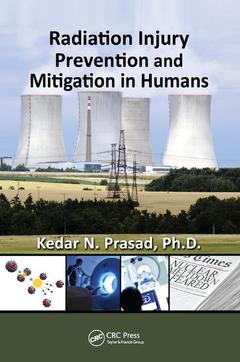Radiation Injury Prevention and Mitigation in Humans
Auteur : Prasad Kedar

With an estimated 3.3 billion ionizing radiation imaging examinations performed worldwide each year, the growing use of x-ray-based diagnostic procedures raises concerns about long-term health risks, especially cancer. In addition, rapid growth in the number of nuclear power plants around the world increases the risk of a nuclear accident similar to that of Fukushima, Japan. Add to this, exposure to non-ionizing radiation from prolonged cell phone use, proton radiation from solar flares, and potential nuclear conflict or a dirty bomb attack, and the need to expand our repertoire of radiation prevention and mitigation strategies becomes increasingly urgent.
Radiation Injury Prevention and Mitigation in Humans
- Physics of ionizing radiation and radiological weapons, principles of nuclear reactors, the types of radiological weapons, and consequences of their explosions
- Acute and late health effects of high and low doses of radiation
- The efficacy of FDA-approved and unapproved radioprotective and radiation mitigating agents
- The efficacy of radioprotective and radiation mitigating agents not requiring FDA approval (antioxidants and herbs)
- Scientific data and rationale in support of using micronutrient preparations containing dietary and endogenous antioxidants for preventing acute radiation sickness and for mitigating the late adverse health effects among survivors of high and low doses of radiation
Examining cutting-edge advances in the research of the effects of non-ionizing radiation on cellular and genetic levels, the book proposes an implementation plan of both physical and biological protection strategies. It covers the full range of potential sources of radiation and includes an up-to-date list of helpful resources and references for the latest research and readings on the topic.
Physics of Nuclear Bombs and Nuclear Reactors. Acute Damage by Irradiation with High Doses of Ionizing Radiation in Humans. Long-Term Damages among Survivors of High Doses of Ionizing Radiation. Prevention and Mitigation of Acute Damage Produced by High Doses of Ionizing Radiation. Prevention and Mitigation of Long-Term Damages among Survivors of High Doses of Ionizing Radiation. Health Risks of Low Doses of Ionizing Radiation (Diagnostic Radiation. Prevention and Mitigation of Damages after Low Doses of Ionizing Radiation. Health Risks of Non-Ionizing Radiation (UV Light and Electromagnetic Radiation). Prevention and Mitigation of Damages after Exposure to Non-Ionizing Radiation. Implementation Plan for Non-Toxic and Cost-Effective Radioprotective and Radiomitigating Agents.
Dr. Kedar N. Prasad obtained a master’s degree in zoology from the University of Bihar, Ranchi, India, and a PhD in radiation biology from the University of Iowa, Iowa City, in 1963. He received postdoctoral training at the Brookhaven National Laboratory, Long Island, New York, and joined the Department of Radiology at the University of Colorado Health Sciences Center, where he became a professor and director for the Center for Vitamins and Cancer Research.
Dr. Prasad has published over 200 articles in peer-reviewed journals, and authored and edited 15 books in the areas of radiation biology, nutrition and cancer, and nutrition and neurological diseases, particularly Alzheimer’s disease and Parkinson’s disease. These articles were published in highly prestigious journals such as Science, Nature, and Proceedings of the National Academy of Sciences in the United States. Dr. Prasad has received many honors, including an invitation by the Nobel Prize Committee to nominate a candidate for the Nobel Prize in Medicine for 1982; the 1999 Harold Harper Lecture at the meeting of the American College of Advancement in Medicine; and an award for the best review of 1998–1999 on antioxidants and cancer and 1999–2000 on antioxidants and Parkinson’s disease by the American College of Nutrition.
Dr. Prasad is a Fellow of the American College of Nutrition and served as president of the International Society of Nutrition and Cancer, 1992–2000. He belongs to several professional societies, such as the American Association for Cancer Research and the Radiation Research Society. Currently, he is chief scientific officer of the Premier Micronutrient Corporation.
Date de parution : 09-2018
15.6x23.4 cm
Date de parution : 04-2012
Ouvrage de 304 p.
15.6x23.4 cm
Thèmes de Radiation Injury Prevention and Mitigation in Humans :
Mots-clés :
Ionizing Radiation; Radiation Induced Cancer; radiation; Bm; first response; Radiation Workers; emergency preparedness; Nonneoplastic Diseases; Reduce Radiation Damage; Cancer Risk; Radiation Injury; Micronutrient Preparation; Alpha Tocopheryl Succinate; Endogenous Antioxidants; GI Syndrome; Noncancerous Diseases; Dirty Bombs; Physical Half Life; Radiation Protection Strategies; Radiation Protection; Multiple Micronutrient Preparation; Ars; Alpha Lipoic Acid; Uva Radiation; DNA DSBs; Radioprotective Agents; UVB Radiation; Require FDA Approval


